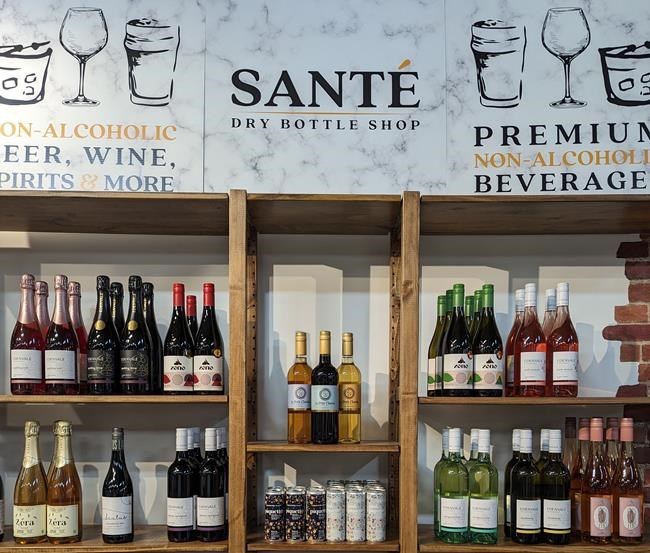Jonathan Barembruch and his wife would often sit with a glass of wine and unwind after long days at work.
But when his wife became pregnant, Barembruch decided to find an alternative for their after-work tradition, setting out to find the best non-alcoholic drinks so the two could still carry on their evening ritual.
Several online retailers sold non-alcoholic wine, beer and spirits, but none of them offered enough information about the products, he recalled. It was hard to decide which one tasted better or which one was better suited for a specific occasion.
"I saw a gap in not only the availability of good non-alcoholic drinks but also the education behind it," said Barembruch, who has a background in the restaurant and bar industry.
This ultimately led Barembruch to open Calgary's first ever non-alcoholic bottle store, Santé Dry Bottle Shop, at Crossroads Market last July.
"I set out to educate and change how people perceive non-alcoholic drinks and show them that there's actual quality and passion and care that goes into crafting these drinks," he said. "They're enjoyable replacements if you're not drinking."
Santé is among several non-alcoholic bottle storefronts that have popped up over the last year or so.
"We're starting to see more of these types of opportunities from a retail standpoint to promote and introduce non-alcoholic beverages through different channels," Robert Carter, a food industry analyst with the StratonHunter Group, said in an interview.
The non-alcoholic beverage industry is constantly improving the taste and quality of the drinks, "which is resonating with consumers," he added.
The younger generation in particular is not as motivated to indulge in alcohol as past generations, said Carter. Meanwhile, older generations are increasingly considering the health consequences of alcohol. In all, this is driving a trend toward health and wellness.
A Statistics Canada survey in 2021 found one in five Canadians was drinking less than they did pre-pandemic.
In 2023, Health Canada changed its alcohol consumption guidelines, saying alcoholic drinks should be limited to two per week — a significant drop from its 2011 report which said a maximum of 10 drinks per week for women and 15 drinks for menwas acceptable.
"Drinking alcohol has been a part of the culture for a long time and getting rid of the habit is much harder than replacing it with a drink which mimics the taste but isn't alcohol,"says Cristian Villamarin, founder of Toronto-based non-alcohol bottle store Bevvy's.
The store opened its doors to customers in January and has since seen thousands of sober-curious visitors — tasting and sampling more than 100 curated non-alcoholic beers, wines and canned cocktails, says Villamarin.
As more non-alcoholic drink varieties get placed on shelves, customers are coming in with more questions about quality, process and prices.
People often ask why a bottle of non-alcoholic wine costs as much as an alcoholic bottle, Villamarin said.
Non-alcoholic wines go through the same lengthy process as alcoholic wines, he said, including distillation, fermentation and aging, but there's an extra step to remove the alcohol from the drink, which can be labour-intensive.
A lot of research and product development goes into making non-alcoholic wines, said Barembruch, including fetching top-quality grapes.
"A big misconception is that non-alcoholic wine is just grape juice," said Barembruch.
Bevvy's recently set up a patio, welcoming people from all walks of life to enjoy drinks on warmer days, without having to commit to purchasing a full bottle.
"It's not just another caffeinated drink or an alcoholic drink — (we) want to be that middle," Villamarin said.
Carter said now may be a "really good time" for non-alcohol storefronts to open as the multi-billion-dollar alcohol industry continues to see a decline.
A December 2023 Statistics Canada report showed alcohol sales in volume terms fell 1.2 per cent over a period tracked between 2021 and 2022 compared with the previous tracking period. It marked the largest drop in more than a decade.
The cost and barriers to open non-alcoholic bottle stores and pubs also aren't as high as their alcohol-serving counterparts, Carter added.
"You don't need to have licensing, you don't have to get permission from the government — all of those barriers that would hold back opening up an alcohol retail store," he said.
But non-alcoholic bottle store owners face a separate set of challenges.
A couple in British Columbia's Port Coquitlam opened booze-free bottle shop Bevees in November, showcasing close to 300 products curated from local and international drink makers.
The idea for the shop and beverage room was in line with other non-alcoholic bottle shops — a chance to sample new drink varieties in person, says store owner Racquel Foran.
But banks and insurance companies didn't understand their business model.
"It was really difficult to get insurance and it's really difficult to get a bank account because they just couldn't wrap their brain around the fact that it wasn't alcohol," Foran said.
"(The idea) was so new that we kept hitting roadblocks just because they didn't understand what we were doing."
"It's difficult because we're still calling the products by the same (names)," she said. "We're still calling them wine and beer and spirits so people hear those words and they think, 'Oh, alcohol.'"
However, Foran is confident the notion will change quickly.
"It's a rapidly growing industry and more and more people are getting into it, and fewer and fewer people are drinking alcohol," she said.
This report by The Canadian Press was first published April 26, 2024.
Ritika Dubey, The Canadian Press



